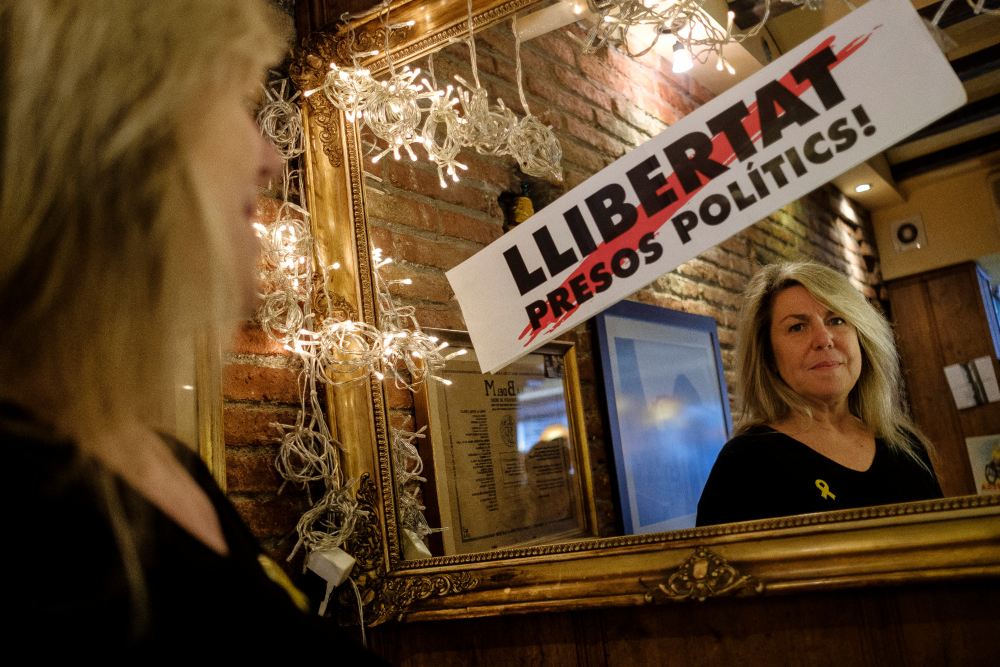
Since October 2017, your brother Toni Comín has been exiled. How are you?
Well, we are wrestlers, we don't have anything else...
When and how did he know that his brother had decided to exile?
On October 27, 2017, after the parliamentary act, we went home, because he invited us to dinner with Sergi, the couple. There he explained the decision and the steps to follow the next day. He was going to make his first stop in France and he asked me for help. For security reasons, she was prepared to move ahead of the car, as it was essential that both of them move in several vehicles and make sure that the route was clean.
How do you remember that day?
It was hard. I had to organize myself in a few hours. From the very beginning I was clear that I would not go alone and I asked Jauma Asensi, head of the list of Catalonia in Comú in the elections on 28 April and so far deputy mayor of the City of Barcelona, to accompany me. She is very close to Toni and knew the details of the context better than anyone else. In addition, he's a lawyer, and he knew he was going to be to our needs without asking questions. We crossed the French border and greeted Toni.
The harshness of repression has been your family comrade. Did you expect the exile of your brother?
Of course, we waited. Moreover, when we had a family crackdown or a dispute between exile, the mother told Toni that, if he was going to jail, he would experience the repression of the very fascists who imprisoned his father. Therefore, from the very beginning, the only option left to us was exile.
How has exile affected you all this time?
Finally, fortunately, the present exile cannot be compared to that of a long time ago, especially because we maintain contact virtually, and that helps. But of course, exile is characteristic of being condemned to live in a country where you don't want to. This is more difficult when there are health problems in the family and in the environment: When Toni was exiled, our brother was ill and died in July in Belgium. The last year has been very hard in this respect. When my brother was only a few days away, we set out to live in Belgium. Now I'm worried about my mother, with her it's harder to do that, and it's clear that if we lose while Toni is exiled, it's going to be a terrible drama. There's nothing worse in life than being away from the people you love.
How do you experience the trial in the Supreme Court?

It is a single cause and affects us all, so if there is acquittal, everyone will be free. It's being hard, because judgment is shaking us in a very emotional way: when the first few days I saw the government and Jordia in the seats of the defendants, it turned my heart around. Well, the trial can be followed by television and I find it very worrying, in the eyes of everyone, the image that both the Prosecutor’s Office and the prosecution want to build. But the most serious thing is that I'm worried because, even though the case is not judicially where it comes from, the sentence is written.
The European courts have, in the meantime, released politicians exiled by the eta scandal. How can you understand it?
The Supreme Court and the Spanish Justice have judicialized a political conflict that has been settled with total normality. Those behind this case are the Francoists who do not respect democracy and who seek to resolve conflicts by imprisoning people. Because the unity of Spain is sacred.
The trial has revived mobilizations against human rights violations both here and there. Have you felt overwhelmed?
At all times. Prisoners and exiles have repeatedly thanked the people for their support. What is more, I would say that mobilisation is one of the reasons that keeps them strong. What is happening is that there is an interest in questioning mobilisation, but mobilisation is still alive and will be multiplied by ten when the judgment is known. What has to be seen is whether, in the face of increased repression, people are able to intensify mobilisations, for example, whether or not they join a call for strike that will last for weeks. We hope so.
What do you think of the differences between the independence parties?
A new strategy is essential. Because the greater the solidarity, the stronger we will be. We must not forget that the first challenge of repression has always been separation, and so we are, in part, the victims of this attempt at separation. Our objective is maintained, and although the roadmap has changed, it is essential to regain solidarity. There is no one left and we must be able to listen to each other and reach agreements. That is what the independence political parties owe to the people.
How do you see the future?
I believe that the judgment against independence leaders is going to be a punishment, and if so, we have the future and hope in the courts in Strasbourg. But this will require at least four years.
Lau agenteak lesio-delituengatik ikertzen ari dira eta horrek galarazten du 2024ko amnistia aplikatzea. Polizia horietako batek, ustez, gomazko bala batekin begi bat zartatu zion Roger Español kataluniarrari.
Walk from a train station, two friends and a hug. This hug will be frozen until the next meeting. I'll come home, he'll stay there. There, too, will be free the painful feeling that injustice wants us to catch. Jesús Rodríguez (Santa Coloma de Gramenet, 1974) is a journalist,... [+]